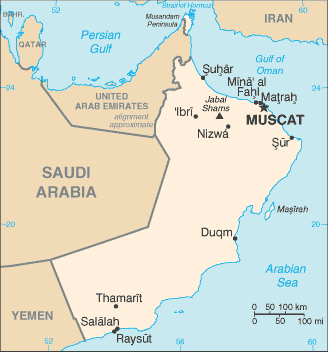|
Oman 
The Sultanate of Oman is a country in the southwestern part of Asia, on the southeast coast of the Arabian Peninsula. It borders the United Arab Emirates in the northwest, Saudi Arabia in the west, and Yemen in the southwest. The coast is formed by the Arabian Sea in the south and east, and the Gulf of Oman in the northeast. The region of Oman was once known by its Sumerian name Magan. Oman constituted one of the Satrapies of the Persian Empire. It was incorporated by that empire around 563 BC. After Oman’s development in the 3rd century BC, the Persians developed an empire in the 4th century BC. This empire lasted until the 7th century AD. In the beginning of the 1st Century AD Arab tribes began to settle into Oman. In 632 the Persian Empire lost power and Oman’s Arab character was established. In the year 751 the Ibadi Muslims made an imamate in Oman. An imamate is a country ruled by an imam, or any of various rulers who claim that they have descent from the prophet Muhammad. These leaders would exercise spiritual leadership over the country. The Ibadi Muslims are considered by other Muslims to be a branch of the Kharijites. The Kharijites is the earliest Muslim sect which was originally among the supporters of Ali, the fourth caliph of Islam. A caliph is very similar to an imam in definition. The Ibadi imamate survived until the mid-20th Century. Oman has been a centre for traders for centuries. In 1508, the main port, Muscat, was captured by the Portuguese, who held it until it was taken by the Ottomans in 1659. These were driven out in 1741, when the present line of sultans was formed by Ahmed ibn Said.
In the early 19th century, Oman grew to a major power, having possessions in Baluchistan and Zanzibar, but these were gradually all lost. In 1891, Oman became a British protectorate, which lasted until 1971. The year prior, sultan Said ibn Taimur had been ousted by his son, sultan Qaboos bin Said Al Said, (ruled 1970 - ). Qaboos has since greatly improved the economic situation of the country, remaining in peace with all other countries in the Middle East. In 1996 the sultan issued a decree promulgating a new basic law that clarifies the royal succession, provides for a bicameral advisory council with some limited legislative powers and a prime minister, and guarantees basic civil liberties for Omani citizens. Military bases in Oman were used (2001) by U.S. forces involved in ground raids against Afghanistan and Osama bin Laden. In 2003 the lower house of the advisory council was freely elected for the first time. Click here to go back to the Middle East Page! This article is licensed under the GNU Free Documentation License. It uses material from the Wikipedia article "Oman". |
|||||||||||